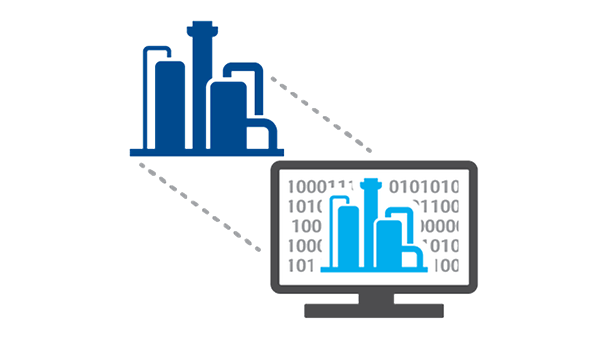Digital twins provide a simulation of the manufacturing or production process as well as the automation systems which control it. Depending on the level of fidelity of the process models, this digital twin can have many uses.
I caught up with Emerson’s Zuwei Jin who shared some of his thoughts around these digital twins. He explained that digital twins:
- Provide obvious value for training operations and maintenance personnel
- May provide a substitute of the physical process in testing and commissioning, assuming the model has high enough fidelity and has transient responding capability as well
- Can be used to tune PID [proportional-integral-derivative] loops (high fidelity and transient behavior capable)
- May directly be used to train a model predictive control (MPC) controller when MPC, instead of PIDs, is adopted
- Can even be used for validation of control strategy if the model itself is first validated
- May be used for optimizing an operation or manufacturing process
 Zuwei shared with me that realizing this value requires high-fidelity models with accurate steady state and transient responses. Without these, applications of the digital twin are more limited to simple operating training, system checkout before commissioning, and perhaps a few other things.
Zuwei shared with me that realizing this value requires high-fidelity models with accurate steady state and transient responses. Without these, applications of the digital twin are more limited to simple operating training, system checkout before commissioning, and perhaps a few other things.
He noted that a data modelling method for learning dynamical behavior is needed as a key development before digital twin technology can be widely applied. The popular primary component analysis (PCA) offers a powerful method in simulating large amount of data in high-dimensional space but PCA lacks the capability of handling the dynamic behaviors within the system. Another possibility is neural network technology.
Emerson technologists have been innovating in this area developing several solutions around machine learning of process dynamic behavior in continuously running systems. Another area of innovation is in advanced control technologies such as MPC coupled with digital twins. Both the MPC controller and the digital twin can be trained by sufficient amounts of actual process data, with only the input and output being reversed.
Zuwei believes that the opportunities to couple machine learning, advanced control and digital twin simulations will likely enable more widespread use to achieve greater levels of optimization and performance improvements.
Visit the Digital Twin Solutions section on Emerson.com for more on how to put this technology into practice today. You can also catch Zuwei co-presenting with a pharmaceutical manufacturer on an approach for using a manufacturing execution system (MES) for R&D workflow management or small volume/high change-over production at the Sept 23-27 Emerson Exchange conference in Nashville.

